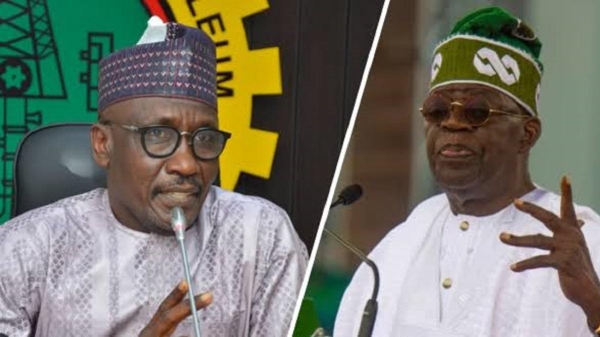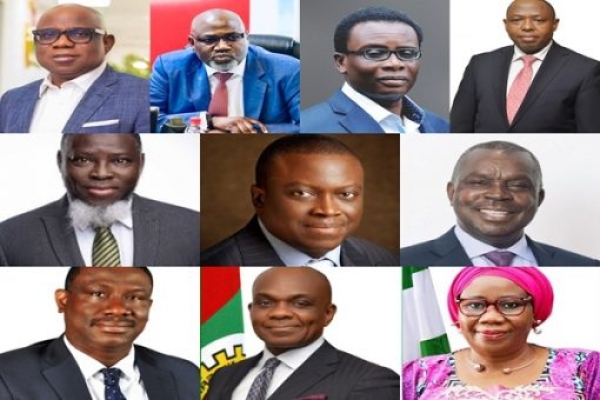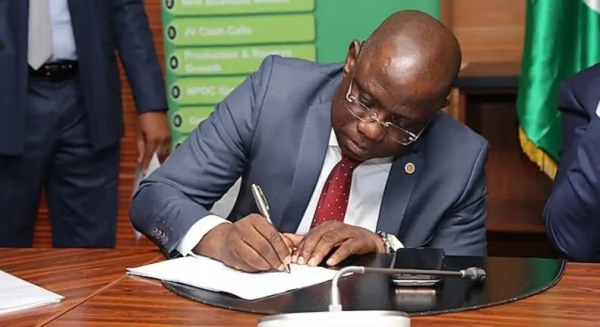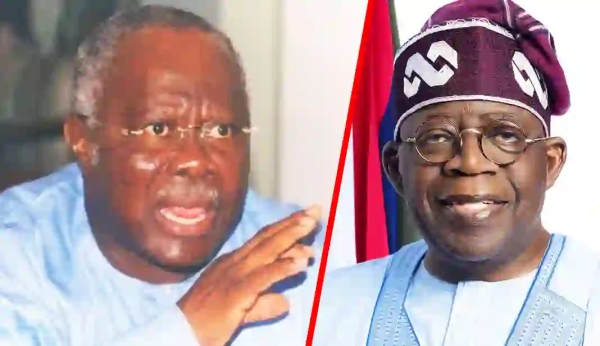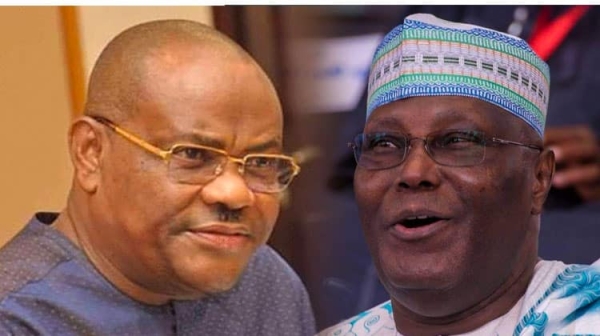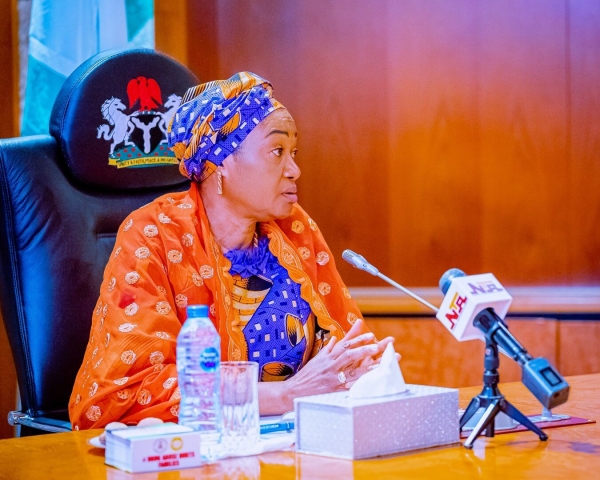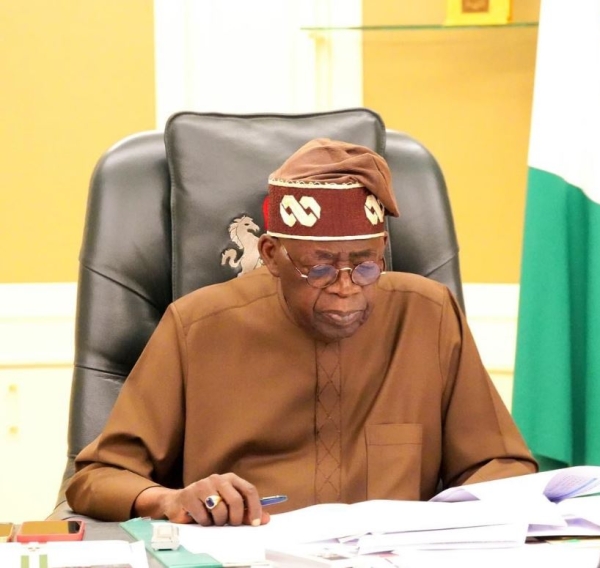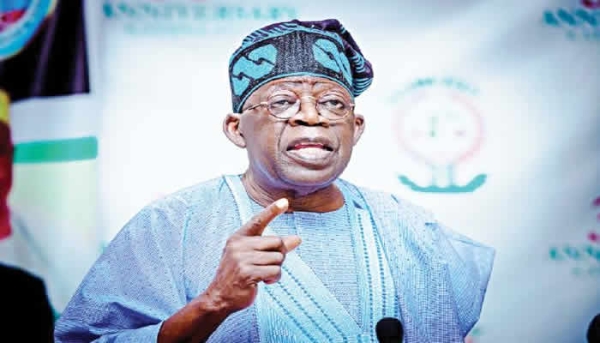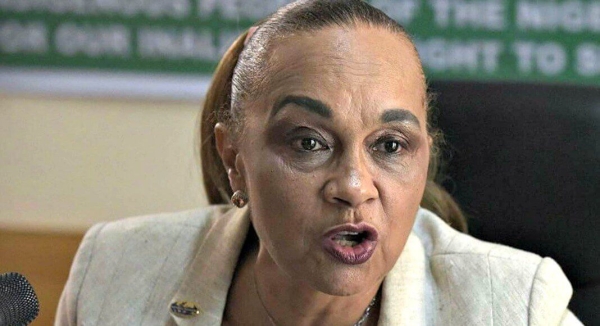TOP NEWS
Reuben's View
Latest News
Search
MOST READ
-
I Lost My Senatorial Seat To Judicial Banditry — Senator Abbo
-
‘We’ve no reason to steal your data,’ - MTN replies customers
-
Why Tinubu sacked Kyari, NNPCL board – Officials
-
‘You Have Started Well’ – Obaseki’s Family Congratulates Okpebholo Over Victory At Election Tribunal
-
Profile Of All New NNPC Board Members After Kyari’s Removal
-
NNPCL raises petrol pump price to N950/litre
-
CBN denies introducing N5,000, N10,000 notes
-
More Heads To Roll In NNPCL, Subsidiaries As Ojulari Assumes Office
-
Man loses N33m meant for studies abroad to sports betting
-
Tinubu Travelling To France Despite Insecurity, Hunger, Crisis – Bode George
-
Rivers Emergency Rule: Court Summons Tinubu, Akpabio, CBN, Others
1923 times -
‘Your Conduct In Rivers And Abuja Has Made It Clear You Were Unsuitable For VP Slot’ – Atiku Hits Wike
1470 times -
Remi Tinubu Breaks Silence On Students’ Mocking Chants During Delta State Visit
1409 times -
Wike’s supporters Dare Bayelsa gov, vow to go ahead with Rally
804 times -
How I Rejected A ₦7 Billion Offer To Reduce ‘Jesus’ In My Songs – Panam Percy Paul
626 times -
Nigerians Can Now Buy Food Without Struggle – Tinubu
617 times -
We won’t succumb: Anger trails fresh emergency rule declaration threat
537 times -
‘Fubara Will Remove All The People Ibas Appointed Upon Resumption’ – Briggs
535 times -
Oluremi Tinubu Video: Delta Government Directs Nursing College To Withdraw Query Against Student
512 times -
Concerns in Bayelsa As Gov Diri’s Supporters Fix Rally for Same Venue With Wike’s allies
502 times








![[OPINION] The Uromi 16 And The Problem With Nigeria - Reuben Abati [OPINION] The Uromi 16 And The Problem With Nigeria - Reuben Abati](https://www.reubenabati.com.ng/cache/mod_bt_contentslider/848d0c6943c9a9cb7639e8f5640d2cbf-4b585f7414a3fc875b761851d4c5fcd4_XL.jpg)
![[OPINION] Breakfast With The Soludos - Reuben Abati [OPINION] Breakfast With The Soludos - Reuben Abati](https://www.reubenabati.com.ng/cache/mod_bt_contentslider/a98b5c30f61dcb10378fdba9f5e472ab-33b747862875f50d863e709f5955da5d_XL.jpg)
![[OPINION] The Emerging Coalition Against Tinubu/APC - Reuben Abati [OPINION] The Emerging Coalition Against Tinubu/APC - Reuben Abati](https://www.reubenabati.com.ng/cache/mod_bt_contentslider/ddd6416fbaa008a5bcbc568f0e3c8857-02972c9f0dee40a6ad85830afbb49758_XL.jpg)
![[OPINION] Nasir El-Rufai’s Defections: PDP, CPC, APC, SDP - Reuben Abati [OPINION] Nasir El-Rufai’s Defections: PDP, CPC, APC, SDP - Reuben Abati](https://www.reubenabati.com.ng/cache/mod_bt_contentslider/817d1e0c4d951b18f15f406968204870-61d46cc1859ac5d4f70406214a7d7e4f_XL.jpg)
![[OPINION] A World Of Godfathers - Reuben Abati [OPINION] A World Of Godfathers - Reuben Abati](https://www.reubenabati.com.ng/cache/mod_bt_contentslider/f282a08e8e116be2577cc430882505bc-6d66582218d28730d47a7b9a32e18004_XL.jpg)
![[OPINION] Babangida’s Book - Reuben Abati [OPINION] Babangida’s Book - Reuben Abati](https://www.reubenabati.com.ng/cache/mod_bt_contentslider/c8905774fa75570e79f747809f6c142f-4452414e756ce827f8bc4b72b9376062_XL.jpg)
![[OPINION] Ayo Adebanjo and Alaperu Basibo: In Requiem - Reuben Abati [OPINION] Ayo Adebanjo and Alaperu Basibo: In Requiem - Reuben Abati](https://www.reubenabati.com.ng/cache/mod_bt_contentslider/32644a58ca6a6a9730d34e04e0b971d4-29f647f2f922ae7f6d08ba2b3025e7df_XL.jpg)
![[OPINION].The Coming Food Revolution In Lagos - Reuben Abati [OPINION].The Coming Food Revolution In Lagos - Reuben Abati](https://www.reubenabati.com.ng/cache/mod_bt_contentslider/a460cd374cf73b084bed0ea4a95f3470-f0e6dbf155e463f366df4402ca7102d3_XL.jpg)
![[OPINION] From Trump to Grammy Blues - Reuben Abati [OPINION] From Trump to Grammy Blues - Reuben Abati](https://www.reubenabati.com.ng/cache/mod_bt_contentslider/68a7f0df2b79f07ef9aa4da35fd3551f-a59719664df1d85791c7a182eca4b6a0_XL.jpg)
![[OPINION] Tanker Explosions, Avoidable Deaths - Reuben Abati [OPINION] Tanker Explosions, Avoidable Deaths - Reuben Abati](https://www.reubenabati.com.ng/cache/mod_bt_contentslider/d2e1e077711de20c5c40eeecc39c245f-8aaa25cc2241805d2decc75cc3486ec5_XL.jpg)
![[OPINION] The Second Coming Of Donald Trump - Reuben Abati [OPINION] The Second Coming Of Donald Trump - Reuben Abati](https://www.reubenabati.com.ng/cache/mod_bt_contentslider/3b214f2ffde1cfc7a1b2cf68cbf556f8-e0b50b219590b369fb715ce040483314_XL.jpg)
![[OPINION] Of Wildfires, Los Angeles, Obasa And Other Human Stories - Reuben Abati [OPINION] Of Wildfires, Los Angeles, Obasa And Other Human Stories - Reuben Abati](https://www.reubenabati.com.ng/cache/mod_bt_contentslider/2db7a112c548580c2fe54624dacb7951-419b0256c841d7d9b34a61d986a2e894_XL.jpg)
![[OPINION] Sixty Support Groups Hold Solidarity Rally In Support Of Governor Soludo's Re-election Bid - Christian ABURIME](https://www.reubenabati.com.ng/media/k2/items/cache/292928469008b6d5aa11dd18a1590a9e_XL.jpg?t=-62169984000)




![[OPINION] MultiChoice tariffs: View from Canada - Seun Bisuga](https://www.reubenabati.com.ng/media/k2/items/cache/500d2df8fe1c82660f0b03a4dc0123f0_XL.jpg?t=-62169984000)




![[OPINION] Bayelsa is Not Rivers, Wike: Diri’s Calm Resistance Against Your Stubborn Disruption - John Egbeazien Oshodi](https://www.reubenabati.com.ng/media/k2/items/cache/87ce213f7627c87deb46eabbfd5408ed_XL.jpg?t=-62169984000)
![[OPINION] The Helicopter That Flew Over Their Illusions: Natasha’s Skyward Triumph Against Akpabio, Bello, Ododo, and Eneji’s Roadblocks of Desperation - John Egbeazien Oshodi](https://www.reubenabati.com.ng/media/k2/items/cache/e9e5ecc6d032564b53e9dfd3dcce509e_XL.jpg?t=-62169984000)
![[OPINION] Russia’s Expanding Geopolitical Influence in Burkina Faso, Mali and Niger - Kestér Kenn Klomegâh](https://www.reubenabati.com.ng/media/k2/items/cache/ed31158c9b13126c6649caef82cd668a_XL.jpg?t=-62169984000)







![[OPINION] Uromi: Matching injustice for injustice - Abimbola Adelakun](https://www.reubenabati.com.ng/media/k2/items/cache/b0841656abacd99cdfe1ca25e2f9dadc_XL.jpg?t=1743687336)

![[OPINION] Akpabio and the allegory of tortoise - Ikechukwu Amaechi](https://www.reubenabati.com.ng/media/k2/items/cache/5a36924216bdc877600d933913545f9b_XL.jpg?t=-62169984000)



![[OPINION] A Nation That Disdains Knowledge - Olusegun Adeniyi](https://www.reubenabati.com.ng/media/k2/items/cache/1cf45ec470a3af177073060bd1ae069b_XL.jpg?t=-62169984000)
![[OPINION] When Are You Going to Get a Proper Job? - Azu Ishiekwene](https://www.reubenabati.com.ng/media/k2/items/cache/e3cbb4c65bc0deb049d419c4748aa114_XL.jpg?t=-62169984000)











![[OPINION] Sixty Support Groups Hold Solidarity Rally In Support Of Governor Soludo's Re-election Bid - Christian ABURIME [OPINION] Sixty Support Groups Hold Solidarity Rally In Support Of Governor Soludo's Re-election Bid - Christian ABURIME](https://www.reubenabati.com.ng/cache/mod_bt_contentslider/2e989bdbd0e0cf65ebb67601120cfc27-292928469008b6d5aa11dd18a1590a9e_XL.jpg)




![[OPINION] MultiChoice tariffs: View from Canada - Seun Bisuga [OPINION] MultiChoice tariffs: View from Canada - Seun Bisuga](https://www.reubenabati.com.ng/cache/mod_bt_contentslider/e6e6a2b5843f8bec043b4d44de3e5b15-500d2df8fe1c82660f0b03a4dc0123f0_XL.jpg)




![[OPINION] Bayelsa is Not Rivers, Wike: Diri’s Calm Resistance Against Your Stubborn Disruption - John Egbeazien Oshodi [OPINION] Bayelsa is Not Rivers, Wike: Diri’s Calm Resistance Against Your Stubborn Disruption - John Egbeazien Oshodi](https://www.reubenabati.com.ng/cache/mod_bt_contentslider/4053f8e813eabe07dd9894e4bbe755e7-87ce213f7627c87deb46eabbfd5408ed_XL.jpg)
![[OPINION] The Helicopter That Flew Over Their Illusions: Natasha’s Skyward Triumph Against Akpabio, Bello, Ododo, and Eneji’s Roadblocks of Desperation - John Egbeazien Oshodi [OPINION] The Helicopter That Flew Over Their Illusions: Natasha’s Skyward Triumph Against Akpabio, Bello, Ododo, and Eneji’s Roadblocks of Desperation - John Egbeazien Oshodi](https://www.reubenabati.com.ng/cache/mod_bt_contentslider/d2f76472587cec14b041e18f95e42a62-e9e5ecc6d032564b53e9dfd3dcce509e_XL.jpg)
![[OPINION] Russia’s Expanding Geopolitical Influence in Burkina Faso, Mali and Niger - Kestér Kenn Klomegâh [OPINION] Russia’s Expanding Geopolitical Influence in Burkina Faso, Mali and Niger - Kestér Kenn Klomegâh](https://www.reubenabati.com.ng/cache/mod_bt_contentslider/04d0cc8dd0ff958b9abeb6a50a89e313-ed31158c9b13126c6649caef82cd668a_XL.jpg)







![[OPINION] Uromi: Matching injustice for injustice - Abimbola Adelakun [OPINION] Uromi: Matching injustice for injustice - Abimbola Adelakun](https://www.reubenabati.com.ng/cache/mod_bt_contentslider/e1fcaf07c1eb2b72f34a5a1d873345c9-b0841656abacd99cdfe1ca25e2f9dadc_XL.jpg)

![[OPINION] Akpabio and the allegory of tortoise - Ikechukwu Amaechi [OPINION] Akpabio and the allegory of tortoise - Ikechukwu Amaechi](https://www.reubenabati.com.ng/cache/mod_bt_contentslider/4b17ab70e355ad950147e0aada1cb94a-5a36924216bdc877600d933913545f9b_XL.jpg)



![[OPINION] A Nation That Disdains Knowledge - Olusegun Adeniyi [OPINION] A Nation That Disdains Knowledge - Olusegun Adeniyi](https://www.reubenabati.com.ng/cache/mod_bt_contentslider/85a6abdc35052a562ac06dc3bc9b61ed-1cf45ec470a3af177073060bd1ae069b_XL.jpg)
![[OPINION] When Are You Going to Get a Proper Job? - Azu Ishiekwene [OPINION] When Are You Going to Get a Proper Job? - Azu Ishiekwene](https://www.reubenabati.com.ng/cache/mod_bt_contentslider/4641b11989e58c328f3ec8710ff505b7-e3cbb4c65bc0deb049d419c4748aa114_XL.jpg)



















![[STATEHOUSE PRESS STATEMENT] President Tinubu To Embark On Working Visit To Paris [STATEHOUSE PRESS STATEMENT] President Tinubu To Embark On Working Visit To Paris](https://www.reubenabati.com.ng/cache/mod_bt_contentslider/555069b9e41cfccd729e0790512a1a3b-1baaf1f7f7ef357ebd6412a16a3791c2_XL.jpg)
![[OPINION] Why Are The Police, DSS, And President Tinubu Failing Natasha Akpoti-Uduaghan? Must She Be Killed Before You Act? - John Egbeazien Oshodi [OPINION] Why Are The Police, DSS, And President Tinubu Failing Natasha Akpoti-Uduaghan? Must She Be Killed Before You Act? - John Egbeazien Oshodi](https://www.reubenabati.com.ng/cache/mod_bt_contentslider/64d659d35b639f1e9db94db564d67b10-cf5a7fc1909672667957237aa1ef8abe_XL.jpg)




















![[OPINION] Urging The Powers That Be To Allow Natasha To Breathe - Isaac Asabor [OPINION] Urging The Powers That Be To Allow Natasha To Breathe - Isaac Asabor](https://www.reubenabati.com.ng/cache/mod_bt_contentslider/0ba01eb4478af9357dad005cf595d9e5-30e0ddb81ba2fd7264e10524685489ed_XL.jpg)
![[OPINION] Who Pushed Uromi People To The Wall? - Isaac Asabor [OPINION] Who Pushed Uromi People To The Wall? - Isaac Asabor](https://www.reubenabati.com.ng/cache/mod_bt_contentslider/cb76d817cfe6b289851d27a1b7d22017-0ca0ec317e0b4b8e7c51efb20d8a2b68_XL.jpg)


![[OPINION] Nostalgia: Between Benazir Bhutto & Natasha Akpoti - Richard Odusanya [OPINION] Nostalgia: Between Benazir Bhutto & Natasha Akpoti - Richard Odusanya](https://www.reubenabati.com.ng/cache/mod_bt_contentslider/5d6869a4e0c90b62d417c6a79c117811-f088b6d17c41ddb2c63c8f9efd78848f_XL.jpg)






![[OPINION] How relevant are monarchies in contemporary governance system? - Jide Ojo [OPINION] How relevant are monarchies in contemporary governance system? - Jide Ojo](https://www.reubenabati.com.ng/cache/mod_bt_contentslider/ffbc8a825fc3dba4704f7de20e3b4a6e-9e360a0883f00dbeb4edecb51ea557e4_XL.jpg)
![[OPINION] Naira-for-petroleum deal fails - Lekan Sote [OPINION] Naira-for-petroleum deal fails - Lekan Sote](https://www.reubenabati.com.ng/cache/mod_bt_contentslider/b39166ea5fe2a01a53f1aebaedf6233a-6f06a29d8a9fc8fd5855e78687ea4a2a_XL.jpg)



![[OPINION] ACCIOBA 1979: Many years later, technology brings them together - Okoh Aihe [OPINION] ACCIOBA 1979: Many years later, technology brings them together - Okoh Aihe](https://www.reubenabati.com.ng/cache/mod_bt_contentslider/92164018ccd5d761ba2b13a61b95c6be-1820f232fb5421e9c45765db31583c78_XL.jpg)



![[OPINION] Plaudits for two distinguished Nigerians - Bola BOLAWOLE [OPINION] Plaudits for two distinguished Nigerians - Bola BOLAWOLE](https://www.reubenabati.com.ng/cache/mod_bt_contentslider/c65f2589269fe2eff79571abcd0a1bad-e15bcf9ebb5d97e8b46f69cec6f39223_XL.jpg)
![[STATEHOUSE PRESS RELEASE] President Tinubu Reconstitutes NNPC Limited Board, Appoints New Chairman, Group CEO [STATEHOUSE PRESS RELEASE] President Tinubu Reconstitutes NNPC Limited Board, Appoints New Chairman, Group CEO](https://www.reubenabati.com.ng/cache/mod_bt_contentslider/b43e20a11a11fe8eee935376032c2abb-6af30bfdf3d4edbf3cb0c3c6705d3a57_XL.jpg)



















![[OPINION] Why Nigerian Governments Pay Lip Service to Civil Service Reforms - Tunji Olaopa [OPINION] Why Nigerian Governments Pay Lip Service to Civil Service Reforms - Tunji Olaopa](https://www.reubenabati.com.ng/cache/mod_bt_contentslider/ea0588c7a475fec9b2dcf37df62b87a6-712960cdab797c3c40fff4ab7a21a196_XL.jpg)











